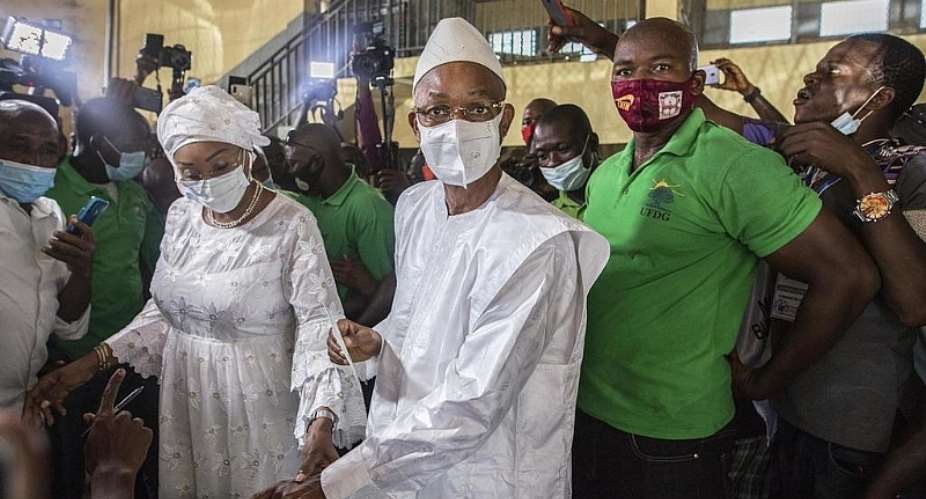At least 21 people have died in unrest in Guinea which broke out following last week's disputed presidential election. International envoys have travelled to Conakry to try and reduce tensions.
RTG state news channel said that 21 people had been killed since 19 October, including officers of the security forces. The opposition claims figures are higher and that some 30 people have died.
President Alpha Condé, 82, won a hotly contested election on 18 October according to official results announced Saturday, setting the stage for a controversial third term.
But his main opponent Cellou Dalein Diallo, 68, disputes the results. He claimed victory last week, citing data his activists gathered at individual polling stations.
Diallo's self-proclaimed victory led to a week of clashes between opposition supporters and security forces across the nation.
Mediation efforts
The United Nations, African Union and the 15-nation Economic Community of West African States (Ecowas) sent mediators to Guinea on Sunday to try and negotiate a solution.
The envoys - who include Ecowas Commission President Jean-Claude Kassi Brou and the UN special representative to West Africa, Mohamed Ibn Chambas - met several ministers and government officials on Monday.
They spoke with representatives of Guinea's electoral commission and foreign diplomats and held a two-hour meeting with Diallo, at his Conakry home which police have blockaded for days.
"We set out to bring a bit more trust between the parties, some peace, serenity, and above all stop the violence," said Brou in a brief declaration following the meeting. "I would like to take this opportunity of thanking Cellou Dalein Diallo and all his team with whom we have had good, frank discussions. We will be continuing our consultations."
Cellou Dalein Diallo told RFI he "wasn't expecting much from the emissaries," whom he considered were "always on Alpha Condé's side".
Protests
Anti-Condé protests were due to resume in the city early Monday and many shops stayed shut, but few people took to the streets in the end.
"In my neighbourhood, people say they are waiting to see the outcome of the joint mission," said a suburban resident who declined to be named.
Scars from the unrest were apparent in the Conakry neighbourhood of Wanindara - an opposition stronghold - with burned-out vehicles lying on the roadside.
Mohamed Saliou Camara, whose house was torched, said Condé and Diallo supporters had clashed in the area.
Much of the turbulence centres on a third term for Alpha Condé, whom opponents accuse of drifting into authoritarianism.
He pushed through a new constitution in March which he argued would modernise the country. But it also allowed him to bypass a two-term limit for presidents.
(with AFP)





 Avoid pre-registered SIMs, buyer and seller liable for prosecution – Ursula Owus...
Avoid pre-registered SIMs, buyer and seller liable for prosecution – Ursula Owus...
 Election 2024: Mahama has nothing new to offer Ghanaians, Bawumia is the future ...
Election 2024: Mahama has nothing new to offer Ghanaians, Bawumia is the future ...
 OSP files fresh charges against ex- PPA Boss
OSP files fresh charges against ex- PPA Boss
 Withdraw unreasonable GH¢5.8m fine against former board members – ECG tells PURC
Withdraw unreasonable GH¢5.8m fine against former board members – ECG tells PURC
 Akroma mine attack: Over 20 armed robbers injure workers, steal gold at Esaase
Akroma mine attack: Over 20 armed robbers injure workers, steal gold at Esaase
 Those who understand me have embraced hope for the future — Cheddar
Those who understand me have embraced hope for the future — Cheddar
 Ghana will make maiden voyage into space should Bawumia become President — Chair...
Ghana will make maiden voyage into space should Bawumia become President — Chair...
 Train crash: Despite the sabotage, we shall not be deterred and will persevere —...
Train crash: Despite the sabotage, we shall not be deterred and will persevere —...
 Tema-Mpakadan railway project a perversion of the original viable concept design...
Tema-Mpakadan railway project a perversion of the original viable concept design...
 Train crash: Elsewhere, everyone involved in the test will either be fired or re...
Train crash: Elsewhere, everyone involved in the test will either be fired or re...
